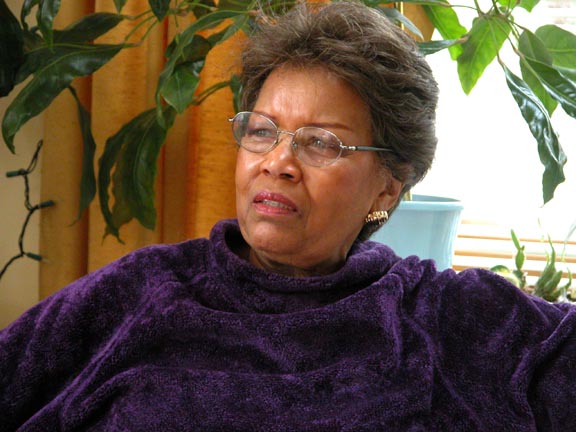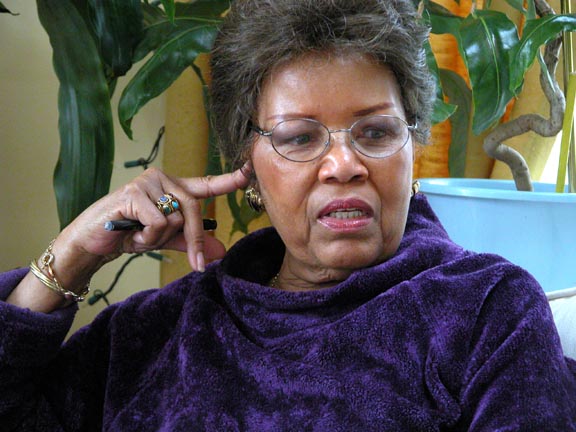Marie Allen is at home in the comfortable study that she built at her Munroe avenue house in Oak Bluffs: a place to read books and listen to the blues, where a carved wooden giraffe peers from behind the couch, African figurines line a tall bookcase and her granddaughter's stuffed toy dog rests on a cushion.
Mrs. Allen also is at home on Martha's Vineyard: an Island where she was married, where her children took their first steps, where her own daughter was married and where she retired about six years ago.
Yet Mrs. Allen's first glimpse of the Island, which came more than 50 years ago, was unplanned, if romantic.
"We eloped," she said, recalling the day that she and her late husband, Milton, boarded a train at South Station in Boston. "When we came, I didn't know where I was going. It took forever. It made its stops every five or 10 minutes.
"Then, when we got to Woods Hole, I said, ‘Oh, we're finally here,' and he said, ‘No, now we've got to take the boat.' So that was my initiation for coming to Martha's Vineyard."
Marie and Milton were married in the Methodist parsonage on New York avenue in Oak Bluffs. In the coming decades, they would return to the Island every summer, first renting from friends and later staying at a house that Mrs. Allen bought at auction with savings she had put aside. She served for 20 years on the Martha's Vineyard Commission, appointed to the land use agency by three separate governors.
But it didn't take Mrs. Allen long to learn that the pretty summer Island had a less attractive side.
For their first anniversary, she and her husband went to dine at a restaurant in Edgartown. They were denied service. One reason that blacks concentrated in Oak Bluffs, she said, is that people refused to sell them homes in Edgartown. Even in the summers, blacks tended to stay at homes owned by other blacks, since traditional hotels would not rent to them.
Those experiences showed her that the Vineyard was not isolated from racism. So Mrs. Allen - a member of the NAACP Boston chapter who lived through that city's turmoil in the 1960s and 1970s - joined the Vineyard chapter when she retired to the Island. The national organization is dedicated to racial justice.
The chapter now has elected her president. Mrs. Allen plans to grow the organization. She hopes to double its membership, from 200 to 400, diversify its makeup, add more corporate memberships and develop a youth group to mentor future leaders.
She's also involved with initiatives to make a real difference in the lives of people of color on the Vineyard. The chapter is negotiating with the contractor on the Oak Bluffs Public Library project to diversify the project's work force, and intends to bring similar concerns to the table should the Steamship Authority $10 million reconstruction of the Oak Bluffs pier move forward.
"Some days I feel it's overwhelming," she said of her new office. "Some days I feel it's exhilarating."
Mrs. Allen said she is also conscious that what she has undertaken is not a one-woman show. She's fortunate, she said, to be working with a committed team of chapter officers, committee members and volunteers to pursue the Vineyard chapter's mission.
So how is the Vineyard doing when it comes to racism? Is the Island as inclusive as some residents would claim? From her perspective of more than 50 years of Vineyard life, Mrs. Allen said the Island has become far less racist.
But she also said remnants linger.
"The nicest people I ever met I met here on the Island," she said. But some prejudice still seeps out, she said.
"They'll say things that hurt you but they don't mean to. A lot of sensitivity training would help, especially in the town halls."
Mrs. Allen, born in Boston's South End, has pursued a wide variety of endeavors. In the late 1940s, she said, she was the first black secretary to work at Harvard. Later she operated a secretarial business from her home while she was raising her children, and also ran a Montessori school.
She later went to work for the Massachusetts Bay Transportation Authority, rising through the ranks to eventually become assistant secretary of administration in the Weld administration. Along the way, she obtained a master's degree, pursuing her studies while her two children also were in college. Her son, who has three children, is a physician active in public health issues. He has bought a house next to her on Munroe avenue. Her daughter, with two children, is a schoolteacher in Georgia.
In her retirement, she has taken up making jewelry, working in part with turquoise that her son brought back to her from his extended assignments in South Africa. "You have to do something to keep from going crazy around here," she said, but later said her creativity surprised her. She's been selling the jewelry through a web site and the Featherstone Center for the Arts.
Mrs. Allen grew even more involved in Island life when she served on the MVC. Her seat did not carry a vote, which she found frustrating at times, but she welcomed the chance to participate in land use decisions on the Vineyard.
"I was impressed with how the commissioners deliberated over every development," she said. "It's a lot of work - it's a wonderful commission on the Island. The Island is very fortunate to have it," she said.
One of the most contentious proposals Mrs. Allen sat on was the plan to develop a golf course and extensive housing in the southern woodlands in Oak Bluffs. The episode placed the commission in the middle of an issue that bitterly divided the Island.
"People really got kind of personal," she said. "People were saying, ‘You don't know what you're doing, why are you against golf?' And you try to explain to them, ‘I'm not against golf, but I'm against insulting the environment and the land.' But there were people who were just concerned about playing golf."
But while she has seen divisiveness on the Vineyard, Mrs. Allen also has played a role in bringing people together. For the last 28 years, she has been a justice of the peace, marrying couples at places such as the Edgartown Light and Oak Bluffs beaches. One wedding where she officiated drew more than 500 people to the Old Whaling Church in Edgartown.
She also celebrates the Island's natural beauty, something she's made a point of ever since a friend she ran into on a ferry leaving the Island told her to slow down a moment.
"She said, ‘Marie, stop, look. Look at the ocean. Look at the sky. Isn't that beautiful?' I was so busy, rushing back and forth. Now I really appreciate seeing the ocean every day. My greatest serene feeling is just walking down the street, and walking down East Chop Drive, and looking at the ocean. That gives me such pleasure.
"And my favorite, favorite, favorite road is that Edgartown Beach Road. I've done a lot of traveling. I've seen a lot of scenic vistas. But every time I go there, I just love that drive, that ocean drive."









Comments
Comment policy »